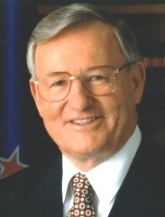| | |||||||||||||
| |||||||||||||
| |||||||||||||
| |||||||||||||
The Mana Motuhake leadership election, 2001 was held in New Zealand on 2 June 2001 to determine the future leadership of the Mana Motuhake political movement. The election was won by List MP Willie Jackson.
| | |||||||||||||
| |||||||||||||
| |||||||||||||
| |||||||||||||
The Mana Motuhake leadership election, 2001 was held in New Zealand on 2 June 2001 to determine the future leadership of the Mana Motuhake political movement. The election was won by List MP Willie Jackson.
Members of Mana Motuhake were having growing concerns about the Labour-Alliance coalition government's Māori policies and were seriously considering leaving the Alliance (an umbrella party of 5 smaller parties including Mana Motuhake) as a result. Party members were also concerned that Mana Motuhake's identity was becoming subsumed by the Alliance. [1] This led to internal debate around the direction the party was being led, eventually leading Willie Jackson to challenge Sandra Lee for the leadership of the party.
A vote was the first item of business at the party's 2001 annual meeting held in Māngere, South Auckland. After initiating the challenge, Jackson had invited Lee to withdraw her name from the ballot, but she decided against it forcing a ballot from party delegates. [2]
Lee had been an MP since 1993 and became Deputy Leader of the Alliance that same year. In 1994 she became leader of Mana Motuhake upon the retirement of party founder Matiu Rata. Questions were also raised over revelations of her personal life which led senior party members to approach her and voice concern that her affair with Te Puni Kokiri adviser Anaru Vercoe was distracting her from the leadership of the party. [3]
Jackson, a List MP since 1999, offered a platform of re-energizing the party, which drew support from many newer party members. Jackson was also highly critical of his party's failure to persuade the Government to do more for Māori and said that Mana Motuhake had become "virtually invisible" under the current leadership. [2] Media also suspected that Jackson was looking for revenge against Lee, who effectively blocked his first attempt to get into Parliament in 1996 when she insisted that Alamein Kopu be ranked ahead of him on the Alliance Party list. [4]
The following table gives the delegate ballot results: [4]
| Name | Votes | Percentage | |
|---|---|---|---|
| Willie Jackson | 109 | 75.69% | |
| Sandra Lee | 35 | 24.31% |
Supporters of Lee later raised questions about the validity of the vote citing concerns over two busloads of "strangers" that were brought in. The claims were refuted by Jackson who labeled the suggestion as "nonsense". [5]
After his victory was announced, Jackson promised to expel life member Nellie Rata (widow of Matiu Rata) for defecting to ACT and pledged to ask Labour to stand aside for Mana Motuhake in at least one Māori seat at the next election in 2002, a scenario that Labour leader Helen Clark refused to do stating that Labour dealt with the Alliance, not Mana Motuhake. [4] Jackson also affirmed to the media that he had no intention of leading Mana Motuhake away from either the Alliance or the coalition Government. [2]
Lee said that her duties as Alliance Deputy Leader and as a cabinet minister allowed her less time to devote to Mana Motuhake's activities and organisational matters which counted against her in the ballot. She stated "Unfortunately, I didn't have the numbers on the day and that's politics in a democracy" and also pledged to continue ensuring Mana Motuhake's committal to continuing an active role within the coalition government. [2]
Alliance leader Jim Anderton publicly voiced his support for Lee, saying "it was Ms Lee's patience and long-term view which had got Mana Motuhake into government". [6]

Sandra Rose Te Hakamatua Lee-Vercoe is a former New Zealand politician and diplomat. She served as deputy leader of the Alliance party and was later High Commissioner to Niue.
The Alliance was a left-wing political party in New Zealand. It was formed at the end of 1991 by the linking of four smaller parties. The Alliance positioned itself as a democratic socialist alternative to the centre-left New Zealand Labour Party. It was influential throughout the 1990s, but suffered a major setback after its founder and leader, Jim Anderton, left the party in 2002, taking with him several of its members of parliament (MPs). After the remaining MPs lost their seats in the 2002 general election, some commentators predicted the demise of the party.

James Patrick Anderton was a New Zealand politician who led a succession of left-wing parties after leaving the Labour Party in 1989.

The 2002 New Zealand general election was held on 27 July 2002 to determine the composition of the 47th New Zealand Parliament. It saw the reelection of Helen Clark's Labour Party government, as well as the worst-ever performance by the opposition National Party.
Mana Wahine Te Ira Tangata was a small and short-lived political party in New Zealand. It was established by Alamein Kopu, a member of the New Zealand Parliament who had left her original party. After a short time as an independent MP, Kopu established Mana Wahine as her own party. It was officially registered on 12 June 1998.
Manu Alamein Kopu was a New Zealand politician.

Sir Wallace Edward Rowling, commonly known as Bill Rowling, was a New Zealand politician who was the 30th prime minister of New Zealand from 1974 to 1975. He held office as the leader of the Labour Party.

The 1993 New Zealand general election was held on 6 November 1993 to determine the composition of the 44th New Zealand Parliament. Voters elected 99 members to the House of Representatives, up from 97 members at the 1990 election. The election was held concurrently with an electoral reform referendum to replace the first-past-the-post system, with all members elected from single-member electorates, with mixed-member proportional representation. It saw the governing National Party, led by Jim Bolger, win a second term in office, despite a major swing away from National in both seats and votes, and the carrying of the referendum by 53.9% to 46.1%.

The 39th New Zealand Parliament was a term of the Parliament of New Zealand which began with the general election held on 25 November 1978, and finished with the general election held on 28 November 1981. The dates of the Muldoon Ministry were from 13 December 1978 to 11 December 1981.
The Mana Māori Movement was a New Zealand political party. It advocated on behalf of the Māori people. It was founded by Eva Rickard, a Māori activist. Rickard was originally a member of Mana Motuhake, another Māori party, but quit when Mana Motuhake joined the Alliance. Rickard, believing that an independent Māori party was needed, founded Mana Māori in 1993.

William Wakatere Jackson is a New Zealand politician and former unionist, broadcaster and Urban Māori leader. He was a Member of Parliament for the Alliance from 1999 to 2002 and is currently a Labour Party MP, having been re-elected in 2017.

Māori politics is the politics of the Māori people, who were the original inhabitants of New Zealand and who are now the country's largest minority. Before the arrival of Pākehā (Europeans) in New Zealand, Māori society was based largely around tribal units, and chiefs provided political leadership. With the British settlers of the 19th century came a new British-style government. From the outset, Māori sought representation within this government, seeing it as a vital way to promote their people's rights and improve living standards. Modern Māori politics can be seen as a subset of New Zealand politics in general, but has a number of distinguishing features, including advocacy for indigenous rights and Māori sovereignty. Many Māori politicians are members of major, historically European-dominated political parties, while others have formed separate Māori parties. For example, Te Pāti Māori, holding six of seven Māori electorates, is one such party.

The 43rd New Zealand Parliament was a term of the Parliament of New Zealand. Its composition was determined by the 1990 elections, and it sat until the 1993 elections.

The 42nd New Zealand Parliament was a term of the New Zealand Parliament. Its composition was determined by the 1987 election, and it sat until the 1990 election.

Matthew McCarten is a New Zealand political organiser and trade unionist, of Ngāpuhi descent. McCarten was active with several trade unions including the Hotel and Hospital Workers' Union, the Unite Union, and the One Union; the latter two of which he co-founded.

Mana Māori Motuhake was a Māori political party in New Zealand from 1980 to 2005. The name is difficult to translate accurately, but essentially refers to Māori self-rule and self-determination — mana, in this context, can be understood as "authority" or "power", while motuhake can be understood as "independent" or "separate". The purpose of the party was to unify Māori to gain 'political potency'. From 1991 to 2002, the party participated in the left-wing Alliance.
The Northern Maori by-election of 1980 was a by-election for the Northern Maori electorate during the 39th New Zealand Parliament. It was prompted on 29 April by the resignation of Matiu Rata, a former member of the Labour Party who was establishing a new group, Mana Motuhake. Rata believed that contesting a by-election would give him a mandate for his change of allegiance. In the end, however, his plan backfired when the seat was won by Bruce Gregory, his replacement as the Labour Party candidate.

Matiu Waitai Rata was a Māori politician who was a member of the New Zealand Parliament for the Labour Party from 1963 to 1980, and a cabinet minister from 1972 to 1975. In 1979 he resigned from the Labour Party and formed the Mana Motuhake Party.
Bruce Craig Gregory was a New Zealand politician of the Labour Party.